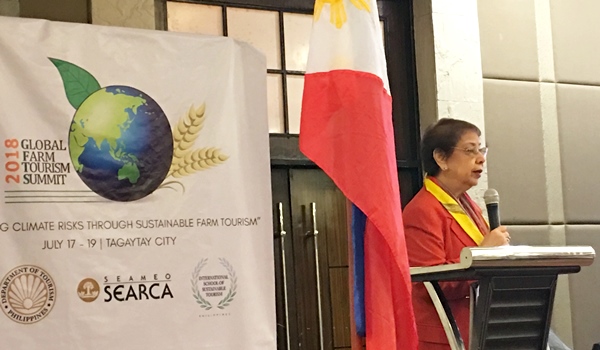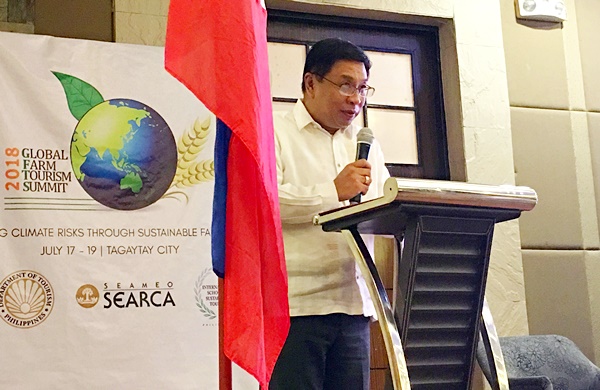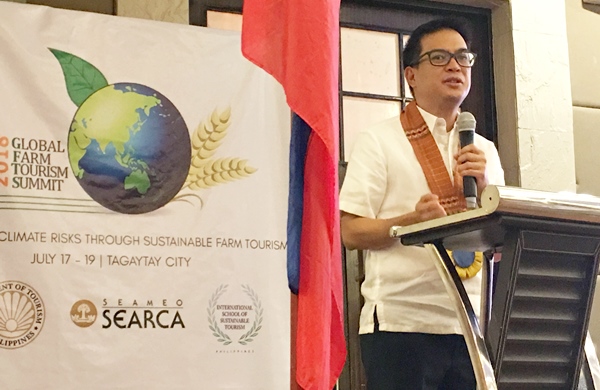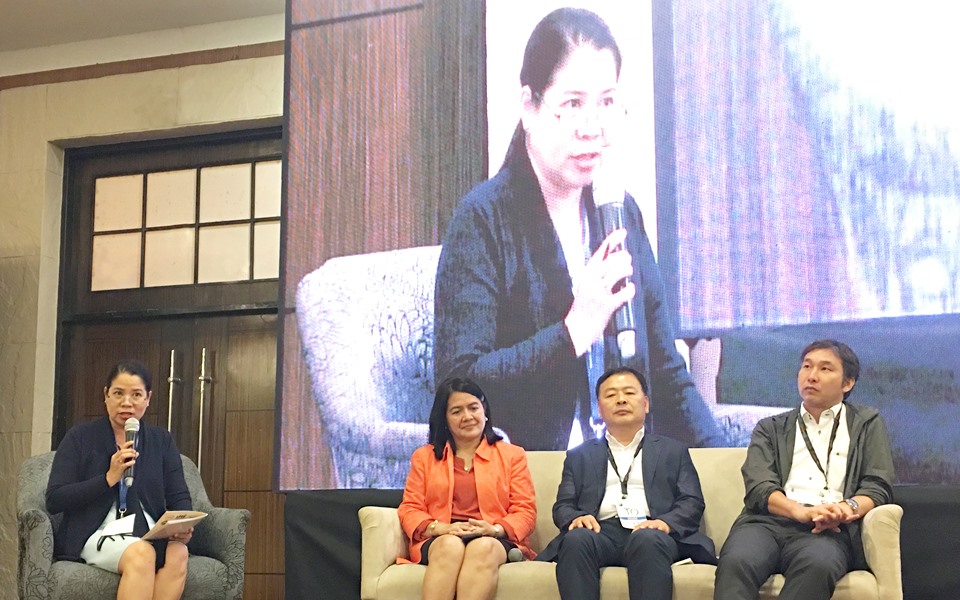Held on 17-19 July 2018, the event gathered 350 participants. In attendance were private farm owners and entrepreneurs, as well as representatives from academe, international development agencies, local government units (LGUs), and national government agencies working in agriculture, tourism, and environment.
 Dr. Mina T. Gabor, President, International School of Sustainable Tourism (ISST) and former Philippine Tourism Secretary, opens the summit, saying 'small farmers, big companies, medium corporations, and families asking about farm tourism. And the fact that they are asking is a big step towards the success of this event.'Leisure farm owners and local government executives shared best practices and success stories, while experts imparted the state-of-the-art in climate risk assessment, resilient crops, and organic farming standards. Country models of farm tourism were also discussed by speakers from Korea, Japan, and the Philippines. Mr. Jesus Domingo, Philippine Ambassador to New Zealand, talked about New Zealand farm tourism and "farm tourism diplomacy."
Dr. Mina T. Gabor, President, International School of Sustainable Tourism (ISST) and former Philippine Tourism Secretary, opens the summit, saying 'small farmers, big companies, medium corporations, and families asking about farm tourism. And the fact that they are asking is a big step towards the success of this event.'Leisure farm owners and local government executives shared best practices and success stories, while experts imparted the state-of-the-art in climate risk assessment, resilient crops, and organic farming standards. Country models of farm tourism were also discussed by speakers from Korea, Japan, and the Philippines. Mr. Jesus Domingo, Philippine Ambassador to New Zealand, talked about New Zealand farm tourism and "farm tourism diplomacy."
Dr. Mina Gabor, who heads ISST, noted that half of the conference participants were from the LGUs.
She told the LGU representatives: "At the end of the day, you will determine the success of farm tourism in the areas. If you don't know what farm tourism is all about, you won't be able to support the people who are going into this business. It is so important for you to know the problems, the opportunities, and the success stories of people who have been in farm tourism."
 Dr. Fernando C. Sanchez, Jr., University of the Philippines Los Baños (UPLB) Chancellor and Chair of the SEARCA Governing Board, welcomes the participants to the summit on behalf of SEARCA.This was affirmed by Dr. Fernando C. Sanchez, Jr., Chancellor of the University of the Philippines Los Baños and Chair of SEARCA's Governing Board, who said "this emerging industry of farm tourism has in fact opened up a whole new perspective for many governments that agriculture and tourism are not totally mutually exclusive."
Dr. Fernando C. Sanchez, Jr., University of the Philippines Los Baños (UPLB) Chancellor and Chair of the SEARCA Governing Board, welcomes the participants to the summit on behalf of SEARCA.This was affirmed by Dr. Fernando C. Sanchez, Jr., Chancellor of the University of the Philippines Los Baños and Chair of SEARCA's Governing Board, who said "this emerging industry of farm tourism has in fact opened up a whole new perspective for many governments that agriculture and tourism are not totally mutually exclusive."
Elaborating on SEARCA's focus on sustainability, Dr. Sanchez added that SEARCA supports farm tourism because it provides a way to showcase agriculture as a lucrative business enterprise for farmers while advocating for sustainable agricultural systems.
In her keynote message delivered by Tourism Assistant Secretary Roberto Alabado III, Philippine Tourism Secretary Bernadette Romulo-Puyat cited how the government supports sustainable farm tourism.
"The Philippines' National Tourism Development Plan 2016-2022 directs efforts towards climate change, risks, and climate management. Therefore, our strategy and action plans include green technologies and innovative conservation measures in the development of farm tourism sites and facilities," she said.
 Tourism Assistant Secretary Roberto Alabado III delivers the keynote message on behalf of Philippine Tourism Secretary Bernadette Romulo-Puyat.For his part, Asec. Alabado said the foremost reason for DOT's support to farm tourism is its inclusive nature—that is, anyone can be a player, from the smallest farmers to the big landowners. He added that since agriculture is still the backbone of the Philippine economy, boosting the tourism aspect of the sector would also spur development in the regions.
Tourism Assistant Secretary Roberto Alabado III delivers the keynote message on behalf of Philippine Tourism Secretary Bernadette Romulo-Puyat.For his part, Asec. Alabado said the foremost reason for DOT's support to farm tourism is its inclusive nature—that is, anyone can be a player, from the smallest farmers to the big landowners. He added that since agriculture is still the backbone of the Philippine economy, boosting the tourism aspect of the sector would also spur development in the regions.
Themed "Managing Climate Risks through Sustainable Farm Tourism," the summit devoted two days to topics that included "farming is sexy," millennial farmers, women empowerment in farm tourism, new sustainable practices, climate resilient crops, climate-smart farming, do-it-yourself promotion of farm tourism, local organic standards and accreditation and, internationally accepted processes, and various country experiences.
The landmark conference was capped by a farm visit on the third day to the International Institute of Rural Reconstruction (IIRR) in Silang, Cavite where participants observed good practices in sustainable farming.
The summit was also supported by the Tourism Promotions Board, Provincial Government of Cavite, IIRR, Automobile Association of the Philippines, and the Department of Interior and Local Government (DILG), Agriculture (DA), and Trade and Industry (DTI). (Leah Lyn D. Domingo)
